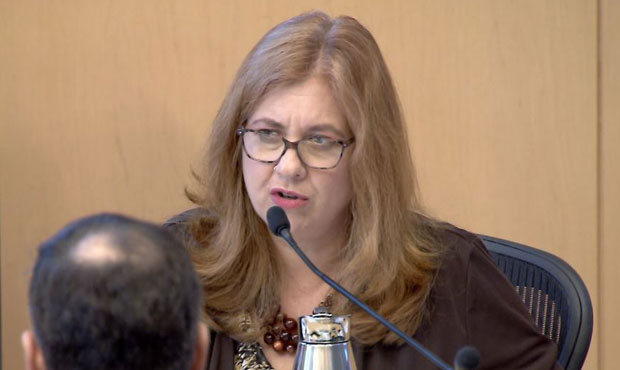Former Seattle public safety advisor raises alarm over Herbold proposal on misdemeanors
Oct 28, 2020, 5:29 AM

Seattle Councilmember Lisa Herbold. (Seattle Channel)
(Seattle Channel)
The idea behind a proposal from Seattle City Council Public Safety Committee Chair Lisa Herbold is to give those arrested for most misdemeanor crimes a pass if whatever crime they committed was done during a behavioral health incident, or due to poverty.
The proposal came to light during a budget meeting on community safety in the city council last Wednesday, and was discussed only briefly toward the end.
That meeting was caught by former Seattle Public Safety Advisor Scott Lindsay — who previously has released reports on Seattle’s systemic failure in the criminal justice system and the issue of prolific offenders — released a critique of Herbold’s plan Monday, slamming the proposal and what he called a backdoor way of sneaking it through the budget outside the normal public process.
“Councilmember Herbold has proposed and is seeking discussion on legislation that would, in effect, create a legal loophole for almost all misdemeanor crimes in Seattle if the defendant was suffering from addiction, mental disorders of really any type, or could connect the crime to some action related to their poverty,” Lindsay explained.
“Those are gigantic loopholes that would, in effect, swallow the entire criminal code, making it almost impossible to prosecute most non-domestic violence, non-DUI misdemeanors in the city of Seattle,” he added.
According to Lindsay’s analysis, misdemeanors make up the bulk of what Seattle police grapple with regularly. Assault, trespassing, harassment, theft, cyber stalking, and sexual exploitation are all covered under the misdemeanor umbrella. All in all, that composes about 12,000 arrests a year, of which the city attorney’s office prosecutes around 5,500.
“All of those would be subject to these legal defenses, and what that means is that in effect, anybody who could claim quote ‘symptoms of addiction, mental disorder, or that they were impoverished,’ would have an absolute legal defense,” he said.
“If somebody who is struggling with methamphetamine addiction commits an assault in downtown Seattle, and they can show to the judge that they have an addiction, they would have an absolute defense to prosecution and conviction for that criminal offense,” Lindsay explained.
He also took issue with the way Herbold brought it in as part of the budget, which he contends is outside the normal public process for legislation.
“This has all been worked up behind closed doors,” Lindsay said. “The process for the budget is truncated, opaque, and is swamped with every other issue that the Seattle City Council is currently facing, all the funding questions for all of the functions of the government. So it’s very hard for the citizens of Seattle, residents of Seattle, businesses that are interested in Seattle to intervene in this without going through the normal democratic checks and balances process.”
“This is absolutely inappropriate as a budget action,” he added.
Councilmember Herbold disagreed.
“We’re in the beginning stages still of the budget process, there is no legislation introduced yet, and budget legislation won’t be voted on until November 23,” she said. “The notion that this legislation is being proposed through a backdoor is nonsense. If anything, the fact that the idea was surfaced in a budget issue paper before legislation is introduced is more transparency, not less. Otherwise, Mr. Lindsay wouldn’t have known about the concept before the bill was introduced.”
Herbold says they have public comment opportunities before every council budget meeting, and have had two evening meetings dedicated to public input on the budget.
“The Council has received public comment at the beginning of every budget meeting, including where this proposal was initially discussed. The proposal will next be discussed at the Budget Committee meeting on Wednesday, October 28,” Herbold said.
During last week’s Wednesday meeting, Herbold explained how the “community is asking that the council consider this to be budget legislation” because of its potential budget implications, should it lead to a large reduction in the number of inmates Seattle sends to the jail, possibly resulting in significant savings by the time they renegotiate the deal with the jail.
As for the proposal itself, Herbold said during the meeting that the idea came from the final Seattle Reentry Work Group report in 2015, which found “that poverty, institutionalized racism, and systemic oppression are root causes that lead to mass incarceration, and that punishment and incarceration are harmful and ineffective tools to address behaviors triggered by poverty and illness,” Herbold said.
She pointed out that the work group recommended the city move away from reliance on the criminal legal system, and work to reduce the criminalization of poverty, and reduce the disproportionate impact the legal system has on BIPOC communities.
Lindsay isn’t surprised, as the proposal appears to have been drafted by the King County Department of Public Defense, King County Equity Now, and Decriminalize Seattle – the latter two groups are coalitions that have been pushing for 50% defunding of the Seattle Police Department, No Youth Jail, and other changes, and are also involved in a Black Brilliance research project to help inform the participatory budget process they’re expected to engage with the city council on.
In a statement Tuesday, Herbold also stressed this proposal does not provide blanket immunity.
The goal of this legislation is to authorize SMC judges to consider a duress or de minimis defense. The legislation does not provide ‘blanket immunity from most misdemeanors,’ the legislation does not ‘provide an absolute defense.’
This legislation does gives the Court and our judges the ability to dismiss a prosecution if they find the defendant’s conduct meets specific circumstances, a nexus between the crime committed and the circumstances the individual is in. It does not require it. This is an important distinction which gives additional authority to our SMC judges to address complex issues.
As we’ve seen in the massive national and international protests in the wake of the murder of George Floyd, it is past time that we reexamine our systems which often perpetuate homelessness and economic instability.
The City currently spends approximately $20 million a year on incarceration, which is known to significantly increase the risk of housing instability and homelessness. This legislation will provide an alternative path forward for judges seeking to assist individuals who’ve committed misdemeanors that can be clearly traced back to mental illness, substance abuse disorders, homelessness and poverty.
Lindsay was unmoved, and says the bottom line is everyone in Seattle needs to pay attention to what the council is doing.
“I think this is a backdoor deal, and we are getting snookered. Council members are going to try and ram this through, and you’re going to be so distracted by the national election and by the other major issues in the council’s budget discussion, including defunding the police by 50%, it’ll be hard to pay attention and really engage on this,” Lindsay said.
“I would say that everybody in Seattle, everybody who cares about Seattle, needs to wake up, look closely, and get engaged, because council members are looking to make dramatic changes to our rights and our protections under our own laws,” he added.
Herbold’s proposal is due to be discussed on Wednesday, Oct. 28, during the 9:30 a.m. budget session. You can find the agenda and link the issue here.













